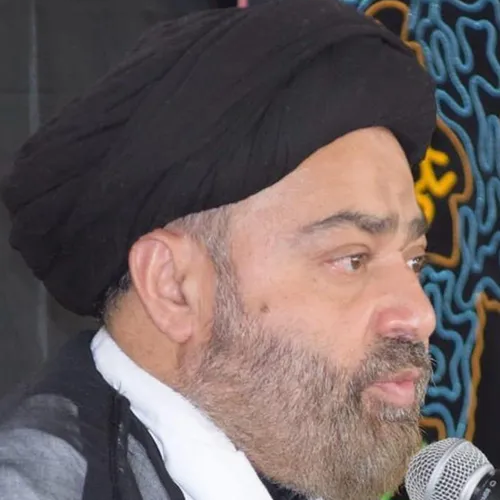Hujjatul Islam Agha Syed Abbas Abedi
This week’s guest in the Friday Bulletin is Hujjatul Islam Agha Syed Abbas Abedi. Through this, we not only become familiar with the Friday prayers in the city of Bolton but also gain more insight into the objectives and achievements of this bulletin, of which he is one of the editorial members:
How would you describe the Friday prayer at Ahle Bait (as) Centre of Bolton in terms of attendance and content?
For the past 15 years, the Ahle Bait (AS) Centre in Bolton has hosted a diverse group of 70 to 80 attendees from various ethnic backgrounds, including Pakistani, Indian, Iraqi, Afghani, and Iranian communities, for our Friday prayers. Notably, some Sunni Muslims are also regular participants. My first sermon focuses on ‘Taqwa’ and moral values, while the second addresses weekly events and current affairs. To accommodate our diverse congregation, the sermons are delivered in English. The attendees are consistently punctual, attentive, and often provide positive feedback both during and after the prayers.
What are your objectives as a contributor to the Friday Bulletin, and what expectations do you have from your colleagues?
The Friday Bulletin is an invaluable resource for Imams, providing essential sermon content, though it can be improved further. Our goal is to refine the bulletin into a vital tool for speakers worldwide. I encourage my colleagues to engage with the bulletin and share their valuable suggestions and opinions to enhance its quality.
The bulletin is currently not interactive; do you have plans to change this?
Yes, we are looking to enhance the bulletin’s effectiveness and interactivity by incorporating feedback from our readers through technology like QR codes and interactive content such as polls and surveys. These additions are aimed at making our audience feel more involved and heard, transforming our bulletin into a dynamic platform that engages its readers actively.
What is the main purpose of Friday prayer?
The main purpose of Friday prayer is to serve as a weekly spiritual renewal for Muslims. It offers a moment for congregational worship, where Muslims gather in mosques to listen to the sermons that typically address important issues, religious duties, and moral lessons. The prayer aims to foster a sense of community and collective worship among Muslims, reinforcing social ties and reminding them of their religious commitments and moral responsibilities. It is considered a special and holy day of the week, encouraging reflection and devotion. It is crucial for the Imam to stay informed about current events and provide guidance on religious and social responsibilities.
As a Friday prayer leader, how would you rate yourself, and what are your thoughts on self-improvement?
Self-praise is not a virtue in Islam; humility and selflessness are key to drawing closer to Almighty Allah. Thus, I would humbly rate myself a zero. To strive for improvement, it is crucial to aim for betterment every day, as complacency leads to loss. Our sixth Imam has wisely stated:
مَنِ اعتَدَلَ يَوماهُ فهُو مَغبونٌ ، و مَن كانَ في غَدِهِ شَرّا مِن يَومِهِ فهُو مَفتونٌ ، و مَن لَم يَتَفَقَّدِ النُقصانَ في نفسِهِ دام نَقصُهُ ، و مَن دامَ نَقصُهُ فالمَوتُ خَيرٌ لَهُ
“If someone’s days are all the same, they’re at a loss. If someone’s tomorrow is worse than today, they’re truly misguided. If someone doesn’t examine their own flaws, their deficiencies will persist. And if their deficiencies persist, death is better for them.”
(Bihar ul Anwar, Vol- 78, Page-277, Hadith-113)
My focus remains on continual self-evaluation and progress, praying for the divine grace to never be satisfied with the status quo.
editor's pick
news via inbox
Subscribe to the newsletter.




